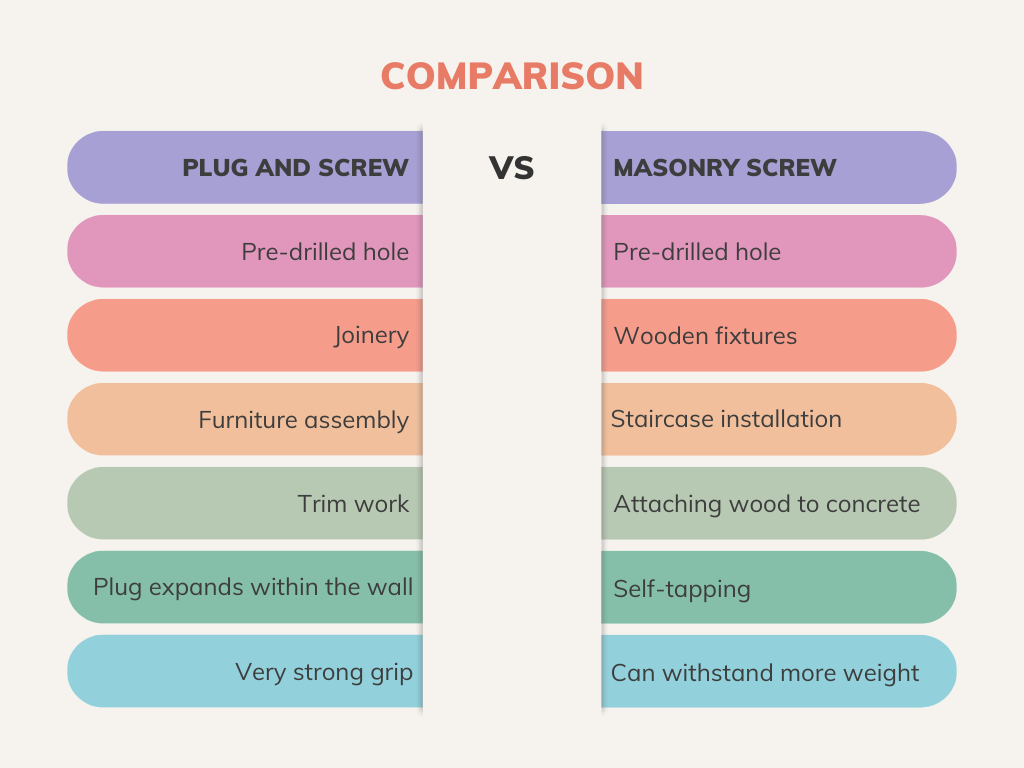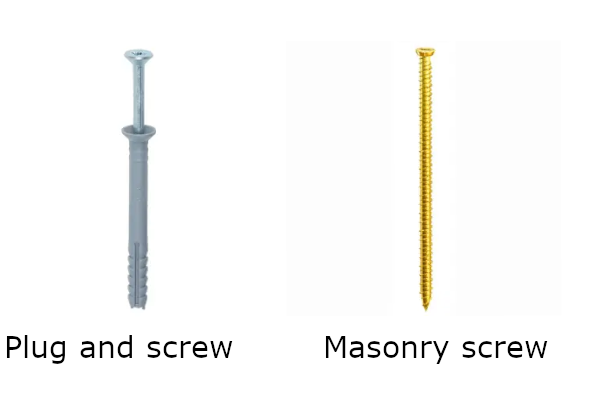Battle of the screws: Plug and screw vs masonry screw
For years, it’s seemed as if the plug and screw has been the go-to screw for carpenters. Reliable, effective and trustworthy, it’s easy to see why it’s been such a staple.
However, some have voiced that they take too long to install and have been looking for alternatives.
In fact, some of you have told us that you’re preferring to go with masonry screws instead, which is very interesting.
Which is better though? Is the plug and screw still the undisputed number one for carpenters, or have things changed?
In light of your comments, we have decided to put a comparison article together to try and find out. We stock both plug and screws and masonry screws, so we have no bias either way, but we’ve provided an objective touch to the question.
By the end, you’ll know the strengths and weaknesses of each and that in itself will hopefully be enough to let you decide which is best for your projects.
What are the key differences between the two screws?
A plug and screw is a plastic plug and a screw. The plug goes into a pre-drilled hole in the wall and then the screw is threaded into it. As you thread the screw, the plug expands within the wall and you get a very strong grip as a result.
A plug and screw can be used for things like joinery, furniture assembly, trim work and more.
Meanwhile, a masonry screw also needs a pre-drilled hole, but it’s much stronger than a plug and screw. So much so, that it can be used for harder materials, such as concrete.
A masonry screw can also be used for securing wooden fixtures, attaching wood to concrete and staircase installation.
In addition, a masonry screw won’t need a plug either as it will self-tap its way into the material.
It’s worth noting that you wouldn’t use either for things like fine joinery, wood-to-wood joinery or hardwood applications.

What makes the plug and screw stand out?
There are a number of reasons why the plug and screw is favoured, none more so than the fact it’s widely available and also cheap. A box of 200 Nylon Hammer Through Fixings - Plug & Screw M5 x 50mm - 25mm Fixing costs £9.73 ex. VAT, for example.
If you ever run out, you’ll likely never have the issue of scrambling around trying to find some, as everyone will have them.
When it comes to actually installing a plug and screw, you don’t need too much either. Aside from a pre-drilled hole, all you need is a screwdriver and then you’re good to go.
Also, you’re much less likely to cause damage to the wall you’re screwing into. This is because of the plug part, which spreads the impact load over a wider area. As such, you’re less likely to have cracks or holes in the wall when using a plug and screw.
And what makes a masonry screw so useful?
The main pro for a masonry screw is its strength. They are very strong and can handle a sizable amount of weight, which is especially useful when attaching shelves or brackets.
It’s difficult to put an exact weight limit on a masonry screw, as many things have to be taken into consideration. This includes the strength of the material and the size of the screw. That being said, anything up to 45kg should be fine.
They are also much easier to install, as you don’t need the plug element of the plug and screw to get it to fit. As soon as the hole is pre-drilled, you’re away.
Also, while they are predominantly designed for heavier materials such as concrete, they can also be used for wood.
This makes them quite versatile too, which can come in extremely handy depending on what your project is.
Where does a plug and screw come short?
The main con for a plug and screw is the one we led this article with; the time it takes to actually install.
As you have to pre-drill a hole first, then line up the plug right, then finally thread the screw, what’s a simple task can take a while.
In addition, that isn’t necessarily enough to guarantee proper installation. If any of the hole size, alignment or screw insertion is wrong, you risk both damage and a weak hold.
If you do want something slightly heavier than normal too, the plug and screw can struggle. They can provide some strength and aren’t exactly weak, but they maybe aren’t the best bet for heavier items.
And the cons of a masonry screw?
While you can use a masonry screw in a lighter material, such as drywall and timber, there is the possibility it’s excessive.
You could end up splitting the timber by pushing the masonry screw too far, while it might not be as strong in a lighter material as it is in a heavier one.
This happens when the thread doesn’t work with the material as well as it would in say, concrete or brick. As such, it gives a weaker hold.
Also, due to the force of the masonry screw, you do run the risk of surface damage. As such, you’ll have to take care when using it, so there’s also an element of skill needed to utilise it properly.

How to choose between plug and screw and masonry screws
If time is on your side, then the plug and screw is still the best choice, all things considered. It’s cheap, it’s effective, it’s reliable and while it can be a little fiddly with the pre-drilled hole and the fitting, it’s still a top solution.
Equally, if you’re against the clock and you’re well within your budget, then a masonry screw is a better choice.
You’ll be able to get a job done very quickly using masonry screws, assuming the material you’re working with isn’t too weak.
If you would like to browse our plug and screws and masonry screws range, you can do so by clicking the links. Equally, if you would like to discuss pricing options or to find out more, you can do so here.